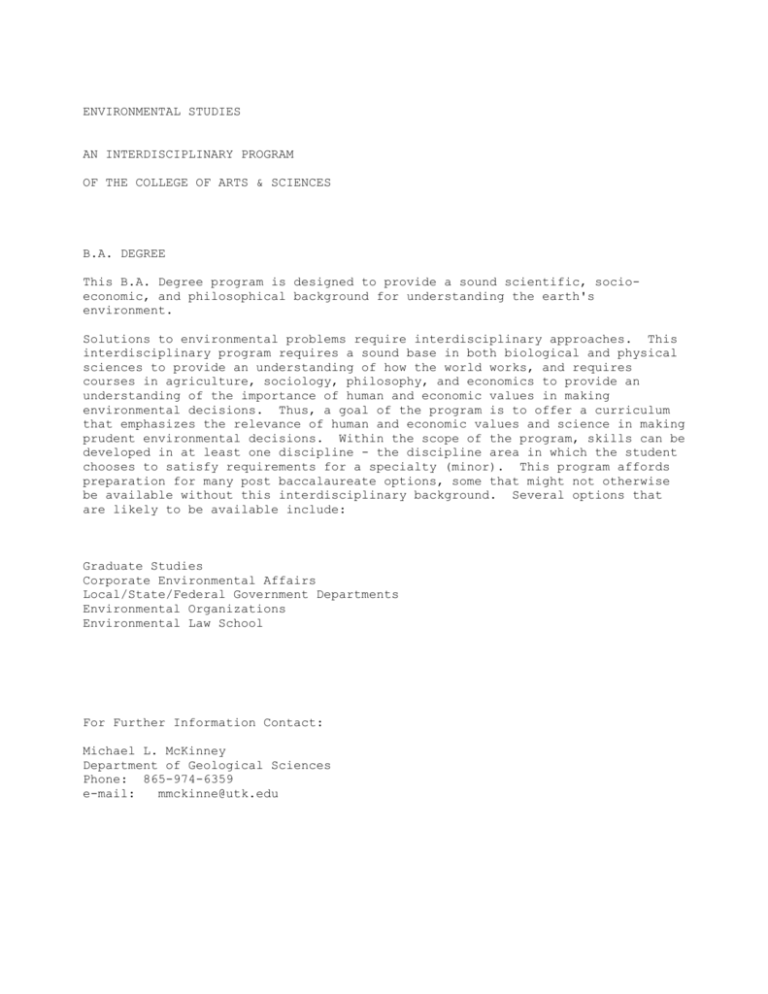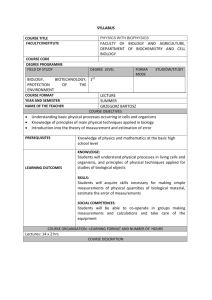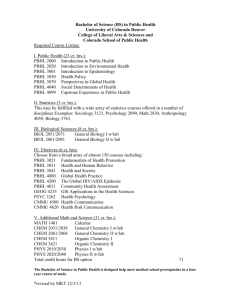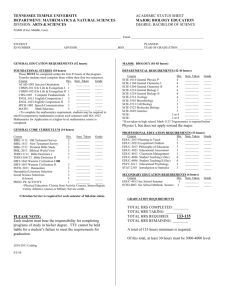ENVIRONMENTAL STUDIES
advertisement

ENVIRONMENTAL STUDIES AN INTERDISCIPLINARY PROGRAM OF THE COLLEGE OF ARTS & SCIENCES B.A. DEGREE This B.A. Degree program is designed to provide a sound scientific, socioeconomic, and philosophical background for understanding the earth's environment. Solutions to environmental problems require interdisciplinary approaches. This interdisciplinary program requires a sound base in both biological and physical sciences to provide an understanding of how the world works, and requires courses in agriculture, sociology, philosophy, and economics to provide an understanding of the importance of human and economic values in making environmental decisions. Thus, a goal of the program is to offer a curriculum that emphasizes the relevance of human and economic values and science in making prudent environmental decisions. Within the scope of the program, skills can be developed in at least one discipline - the discipline area in which the student chooses to satisfy requirements for a specialty (minor). This program affords preparation for many post baccalaureate options, some that might not otherwise be available without this interdisciplinary background. Several options that are likely to be available include: Graduate Studies Corporate Environmental Affairs Local/State/Federal Government Departments Environmental Organizations Environmental Law School For Further Information Contact: Michael L. McKinney Department of Geological Sciences Phone: 865-974-6359 e-mail: mmckinne@utk.edu Revised 9/11/99 COLLEGE OF ARTS & SCIENCES INTERDISCIPLINARY PROGRAMS B.A. DEGREE in ENVIRONMENTAL STUDIES Prerequisites: 1. Life Science: Biology 130-140 or Botany 110-120 * 2. Chemistry 120-130* 3. Geology 101 4. Geography 131 5. Math 123-125, or 141-142, or 151-152* 6. Economics 201* (Introductory Economics) Major Concentration: Core: 1. Biology 250 (General Ecology) 2. Sociology 360 (Environmental Sociology) 3. Philosophy 346* (Environmental Ethics) 4. Economics 462* (Resources and Environ. Policy) 5. Agriculture 333 (Food, Forests, and the Environment) 6. One of the following: Geology 455 (Environ. Geol.) Geography 436 (Water Resources) 7. One of the following: Geography 334 (Meteorology) Plant and Soil Science 432 (Bioclimatology) Geography 434 (Climatology) Satisfy requirements for an approved minor: 8 sem hrs. 8 sem hrs. 4 sem hrs. 4 sem hrs. 6-8 sem hrs. 4 sem hrs. 4 3 3 3 3 3 sem sem sem sem sem sem hrs. hrs. hrs. hrs. hrs. hrs. 3 sem hrs. 15-18 sem hrs. Specialty may be, but not restricted to: Chemistry, Plant & Soil Science, Wildlife & Fisheries Science, Political Science, Forestry, Geography, Geology, Zoology, Botany, Biology, Economics, Sociology or Business Administration * A course that also satisfies a college SKILLS or DISTRIBUTION requirement Courses Required for Specialty (Minor) in Environmentally related areas of Study 1. AGRICULTURAL SCIENCES AND NATURAL RESOURCES A. Basic Requirements: 1) 16 Sem hrs above 200-level with majority at 300-400 level 2) at least 9 sem. hrs taken at UTK B. Agriculture Economics and Business: 1) (19 hrs.), incl. Econ 201*, Agriculture Economics 210, 342, 350, and 6 sem hrs of Agric. Economics and Rural Society electives. C. Food Science and Technology: 1) (32 hrs.)* including: 140, 420-9, 410 or 411, plus electives in Food Science and Technology. D. Forestry: 1) (24 hrs.)* including: FWF 211 or 250, FWF 311 and 9 hrs from FWF 312, 313, 315, 316, and 416. E. Wildlife and Fisheries Science: 1) (31 hrs.)* including 16 hrs from FWF 211 or 250, FWF 300, 317, 416, or WFS 341, 440, 443, 444, and 445. Prerequisites not waived. F. Ornamental Horticulture and Landscape Design: 1) (23 hrs.)* including 3 of the following: 280, 310, 330, 440; any of the following for the remaining hrs: 210, 220, 230, 320, 350, G. 360, 370, 380, 410, 440, 450, 460, 480, 490, 493. No prerequisites waived. Plant and Soil Science: 1) (28 hrs.)* including: 210, 230, plus 9 elective hrs including one course from Group A (311, 312, 331, 332, 333, 334) and one course from Group B (411, 412, 413, 414, 431, 433, 453) 2. BUSINESS ADMINISTRATION A. Option 1 - (25 hrs.)* Accounting 201, 202, Econ. 201, Statistics 201, plus 12 hrs. of upper division Business electives. B. Option 2 - (25 hrs.)* Accounting 201, 202, Econ, 201 and three of the following: Bus. Law 301, Finance 301, Marketing 301; two of the following: Chem Engineering 426, Industrial Engineering 300, 301, 302, 304, 405, 406, Mech. Engineering 553. 3. COMMUNICATIONS A. Broadcasting: 1) (18 hrs.) including Communications 100, 210, Broadcasting 275 plus Broadcasting electives. B. Journalism: 1) (18 hrs.) including Communications 200, 400 plus 12 hrs Journalism courses approved by advisor. 4. ARTS AND SCIENCES A. Anthropology: 1) (24 hrs)* including Anthropology 110, 120, 130 and 15 hours of upper division Anthropology hrs. B. Biochemistry: 1) (25 hrs)* including Chemistry 350, 360, 369; Biochem. 410, 419 plus one additional course from Biochem. 420, 471, 481, and 452. C. Biology: 1) (28 hrs.)* including Biology 210, 220, 230, plus 8 hrs of courses from: Biochem. 410, 419; Botany any 300-400-level courses; Microbiol. any 300-400-level courses; Zoology any 300-400-level courses (not more than 6 hrs. from any one Biological Science Dept./not more than 3 hrs. research. D. Botany: 1) (23 hrs)* including two courses from Biology 210, 220, 230; 1 hr. Botany 371; 6 hrs. of upper division Botany courses. E. Chemistry: 1) (23 hrs.)* including 15 hrs of chemistry courses numbered 200 and above; to include Chemistry 310, 319 and at least one of the following sequences: Chemistry 350-360-369, 471-481-479, or 473483-479. F. Economics: 1) (16 hrs) including Economics 201 plus 12 additional upper division hours, including 311 and 313. G. Geography: 1) (15 hrs.) 15 hrs. of courses numbered 300 and above. F. Geological Sciences: 1) (20 hrs.)* including Geology 101 and 102 or 103, plus 16 hours of Geology courses numbered above 200. H. Physics: 1) (25 hrs.)* including Physics 131-132, 231-231 and 10 hrs. from Physics/Astronomy numbered 300 and above. I. Political Science: J. K. 1) (21 hrs)* including Political Science 101 or 107 and 102 plus 15 hrs. of courses numbered 300 and above. Sociology: 1) (18 hrs.) including Sociology 101 or 110, 200, 321, 331, 360, and one course from: 345, 347, 442, 446, or 464. Zoology: 1) (36)* Biology 110-120 or Zoology 117-118; Chemistry 120-130 or 100-110; Biology 210-220-230, and 9 additional hours of upper division Zoology courses. ( )* includes prerequisite hrs., some of which actually may be satisfied by virtue of being part(s) of the Environmental Studies curriculum. 5. ENGINEERING Non-engineering students cannot declare an engineering minor. 6. RECOMMENDED ELECTIVE COURSES FOR SKILL DEVELOPMENT English 295 - (3 hrs) Business and Technical Writing English 461 - (3 hrs) Advanced Technical and Professional Writing English 462 - (3 hrs) Writing for Publication Speech Communication 100 - (3 hrs) Intr. to Speech Communication Speech Communication 210 - (3 hrs) Public Speaking Speech Communication 240 - (3 hrs) Business and Professional Speaking Speech Communication 330 - (3 hrs) Group Communication IDEALIZED SCHEDULE OF COURSES FOR ENVIRONMENTAL STUDIES MAJOR FIRST YEAR FALL TERM Course Credit Hours English 101 3 Mathematics 123/141/151 3-4 Chemistry 120 4 Non-U.S. History 3 Social Science Course 3 16-17 SPRING TERM Course Credit Hours English 102 3 Mathematics 125/142/152 3-4 Chemistry 130 4 Non-U.S. History 3 Sociology 360 3 16-17 SECOND YEAR FALL TERM Course Biology/Botany Geography 131 Foreign Language Philosophy 240 Humanities Part 2 Credit Hours 4 4 3 3 3 17 SPRING TERM Course Credit Hours Biology/Botany 4 Geology 101 4 Foreign Language 3 Course in Minor/Elective 3 Agriculture 333 3 17 THIRD YEAR FALL TERM Course Hours Biology 250 Economics 201 Foreign Language Course in Minor Philosophy 346 SPRING TERM Course Credit Hours 4 4 3 3 3 17 Speech Communication 100 Geol 455/Geog 436 Foreign Language Course in Minor Course in Minor/Elective Credit 3 3 3 3 3 15 FOURTH YEAR FALL TERM Course Credit Hours Hours Upper Level Distribution 3 Course in Minor 3 Geog 334/Geog 434/P&SS 432 3 Course in Minor/Elective 3 (Elective 3XX) 3 15 ( TOTAL HOURS: ) 128-130 = SPRING TERM Course (Political Science 330) Course in Minor Economics 462 (Speech Communication 330) (Elective) Recommended courses Credit 3 3 3 3 3 15








